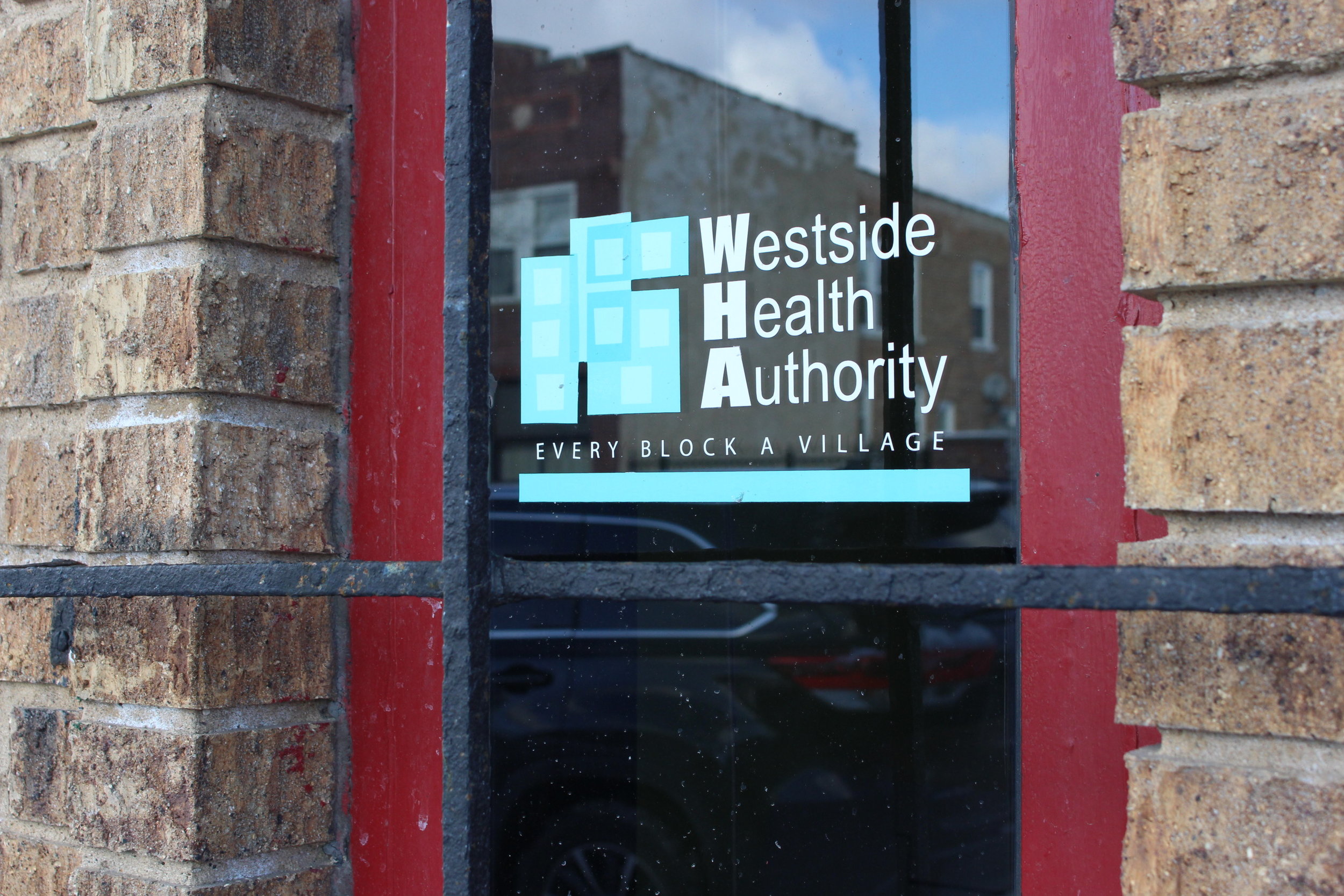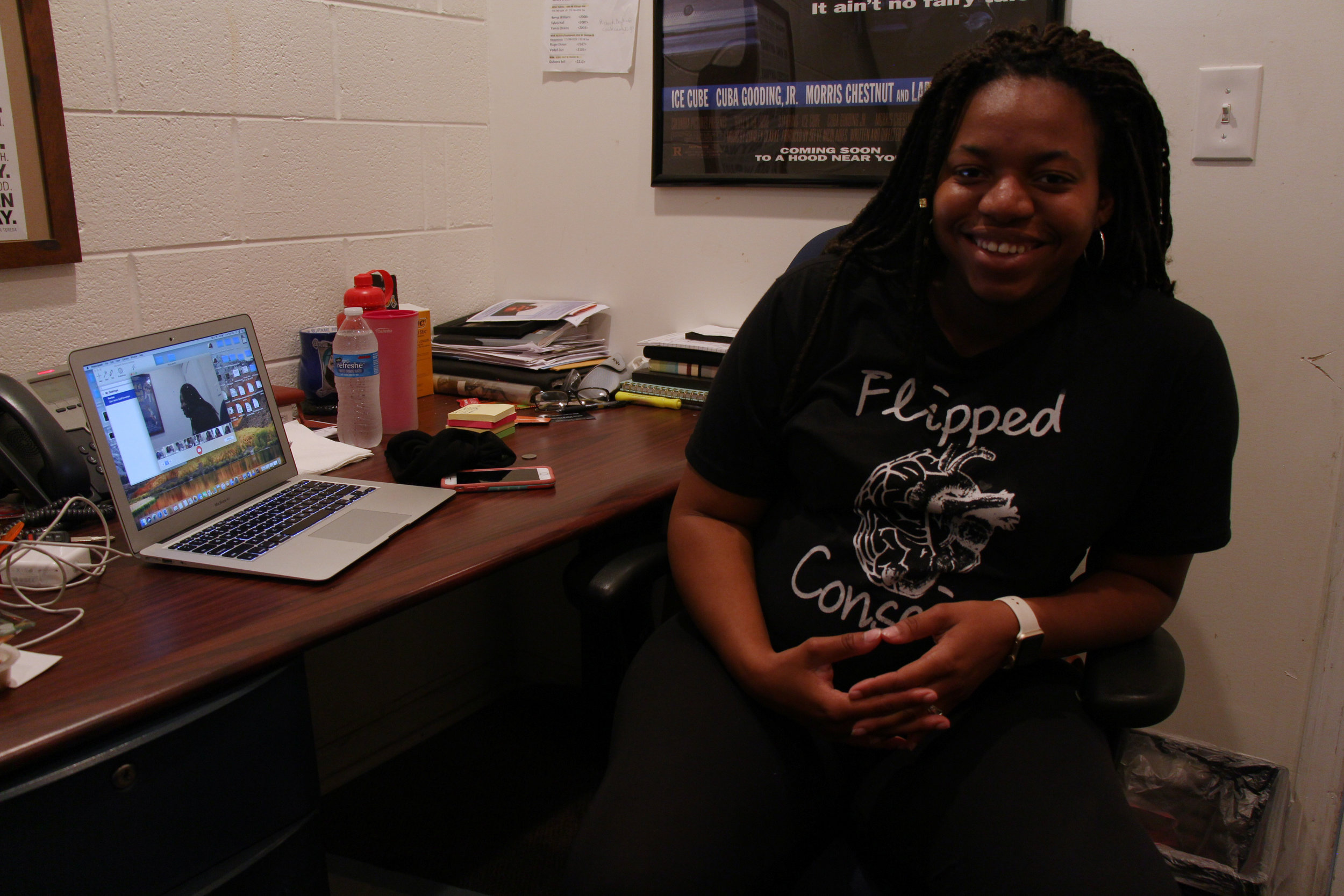Comedic Improv and Mental Health
Most mental health facilities involve white rooms, kleenex boxes, and an overall “clinical” feel. Kanesha Walker Amaro, is the founder and CEO of consulting firm “Flipped Conscious”. She is creating opportunities for mental health to be dissected in black and brown communities that feels more comfortable. Her tool of choice is improv, though the exact relationship between improv and mental health is still being discovered.
In 2010, Second City and Panic/Anxiety Recovery Center partnered to further explore this concept. “Flipped Conscious” was founded in April of 2017 to provide workshop trainings for different workspaces that incorporate various improv tools and strategies. There are workshops for cultural competency, professional and career development, crisis and trauma, and couples.
Kanesha Walker Amaro sitting in her office at the Westside Health Authority. Shirts and hoodies for “Flipped Conscious” are available on her website.
Amaro is from the Austin neighborhood, and she received her bachelor’s degree in theater and her master’s degree in counseling. She also studied comedic writing with Second City. Soon after in 2013, she began working at the Westside Health Authority (WHA), and is currently the senior manager of the youth program there.
“I got a job, a gig here working in the community,” said Amaro. She realized the necessity of mental health in her community.
Being surrounded by the right people, at the right time helped Amaro do what she always wanted to do — help others. Recently, she got the chance to do just that at the annual Black Mental Wellness Expo in Hyde Park. Back in August, she hosted an hour long workshop training. She was interested in working with the Black Mental Wellness Expo after connecting with Kenya Atwater, one of the founders of this event. Amaro thought that this event would be a great opportunity to expose people to improv therapy.
In the article “Comedic Improv Therapy for the Treatment of Social Anxiety Disorder”, Alison Phillips Sheesley, Mark Pfeffer, and Becca Barish elaborate on how improv and mental health are related. “Because improv comedy by its very nature appears to create opportunities for personal growth and exploration, this framework can be adapted by a skilled mental health professional in the context of group therapy for the treatment of psychological issues, such as Social Anxiety Disorder or SAD”.
Amaro talks about young people on the West Side that are diagnosed with and struggling with chemical dependency disorders, specifically dependency on marijuana. While pursuing her master’s degree, Amaro conducted research on a group of five young men who were previously diagnosed with dependency on marijuana. She found that 60 percent of these young men are more likely to engage in creative activities outside of the typical counseling setting. These teens are “self-medicating,” she said.
“I almost can guarantee you that some of it is trauma, some of it is anxiety,” said Amaro. “Let’s get to the root of it and have some fun while we do it, and like let them be kids again.”
Marcus Warren works alongside Amaro as a youth mentor, and has experienced two of Amaro’s workshop trainings at WHA. He enjoys the amount of engagement required and the idea of being in an inviting area with no judgement, as well as the ability to not only express, but explore himself.
Due to stigmas that still surface around mental health, more action can be taken toward making improv therapy more accessible to communities on the west side. Second City is located in the North Side neighborhood Old Town, where improv classes are available specifically for social anxiety.
“Comedic Improv Therapy for the Treatment of Social Anxiety Disorder” goes into detail about incorporating group cohesiveness, exposure, humor, and other healing elements. An attempt is made to create a social environment where individual group members experience feelings of group inclusiveness while confronting feelings of social anxiety.
“For me personally, the best environment to be in [is] one where you can reason with someone else ,” said Warren. “So if I’m able to see how you feel, you’re able to see how I feel, we can have more compassion and more consideration towards each other.”
Another finding in Amaro’s study was that 40 percent of the young men would rather laugh sober than under the influence. In the article, “Laughter is the Best Medicine,” the health benefits of laughter are outlined. To name a few, it can lower and relieve stress, ease tension, and improve one’s mood.
Often in black and brown communities, many people live by the expression, “laugh to keep from crying.” With people like Amaro working to improve the mental health of those in her community, maybe people will not have to cry so often. All it takes is trust, comfort, and some laughter.



